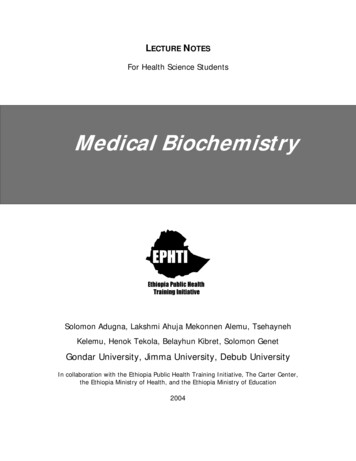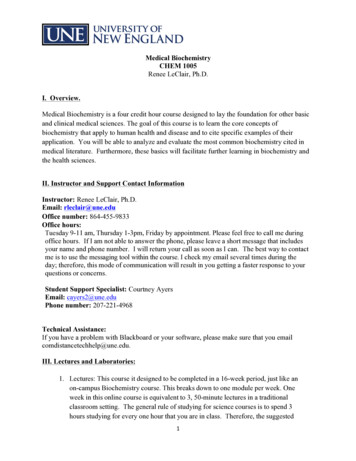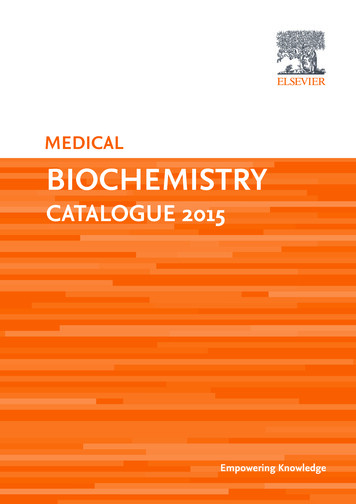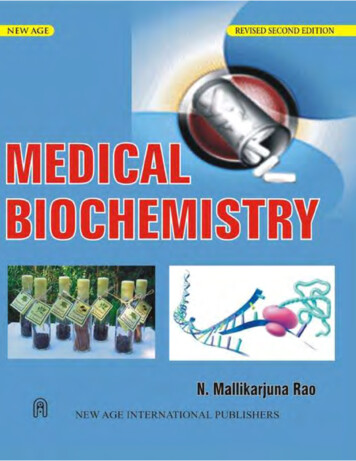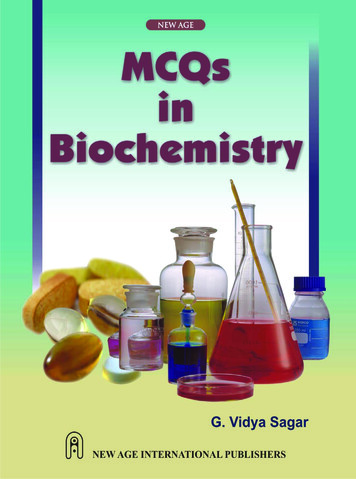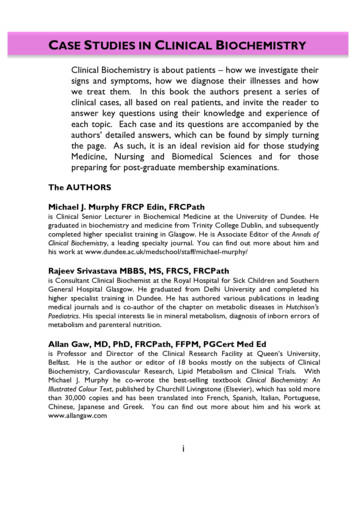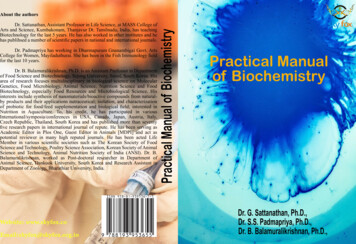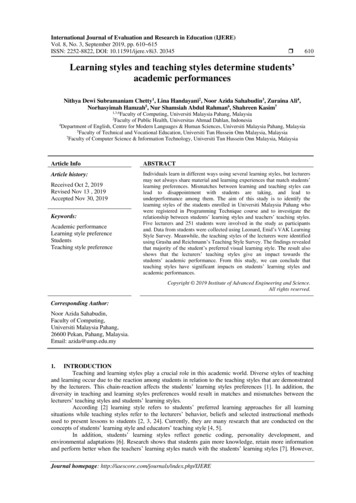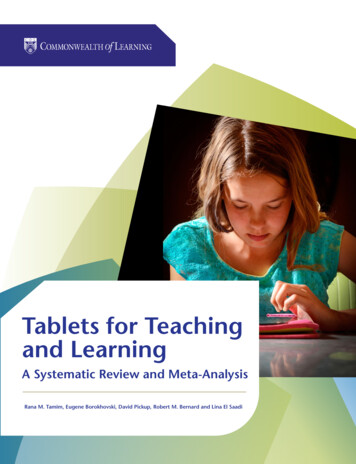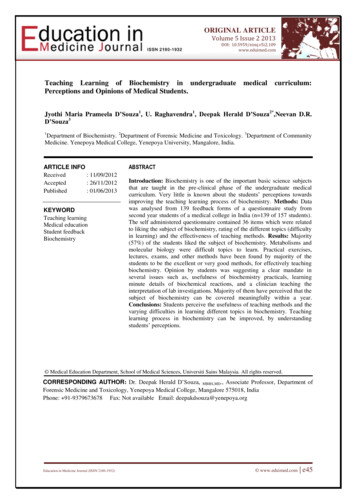
Transcription
ORIGINAL ARTICLEVolume 5 Issue 2 2013DOI: 10.5959/eimj.v5i2.109www.eduimed.comTeaching Learning of Biochemistry in undergraduatePerceptions and Opinions of Medical Students.medicalcurriculum:Jyothi Maria Prameela D’Souza1, U. Raghavendra1, Deepak Herald D’Souza2*,Neevan D.R.D’Souza31Department of Biochemistry. 2Department of Forensic Medicine and Toxicology. 3Department of CommunityMedicine. Yenepoya Medical College, Yenepoya University, Mangalore, India.ARTICLE INFOReceived: 11/09/2012Accepted: 26/11/2012Published: 01/06/2013KEYWORDTeaching learningMedical educationStudent feedbackBiochemistryABSTRACTIntroduction: Biochemistry is one of the important basic science subjectsthat are taught in the pre-clinical phase of the undergraduate medicalcurriculum. Very little is known about the students’ perceptions towardsimproving the teaching learning process of biochemistry. Methods: Datawas analysed from 139 feedback forms of a questionnaire study fromsecond year students of a medical college in India (n 139 of 157 students).The self administered questionnaire contained 36 items which were relatedto liking the subject of biochemistry, rating of the different topics (difficultyin learning) and the effectiveness of teaching methods. Results: Majority(57%) of the students liked the subject of biochemistry. Metabolisms andmolecular biology were difficult topics to learn. Practical exercises,lectures, exams, and other methods have been found by majority of thestudents to be the excellent or very good methods, for effectively teachingbiochemistry. Opinion by students was suggesting a clear mandate inseveral issues such as, usefulness of biochemistry practicals, learningminute details of biochemical reactions, and a clinician teaching theinterpretation of lab investigations. Majority of them have perceived that thesubject of biochemistry can be covered meaningfully within a year.Conclusions: Students perceive the usefulness of teaching methods and thevarying difficulties in learning different topics in biochemistry. Teachinglearning process in biochemistry can be improved, by understandingstudents’ perceptions. Medical Education Department, School of Medical Sciences, Universiti Sains Malaysia. All rights reserved.CORRESPONDING AUTHOR: Dr. Deepak Herald D’Souza, MBBS,MD., Associate Professor, Department ofForensic Medicine and Toxicology, Yenepoya Medical College, Mangalore 575018, IndiaPhone: 91-9379673678 Fax: Not available Email: deepakdsouza@yenepoya.orgEducation in Medicine Journal (ISSN 2180-1932) www.eduimed.com e45
IntroductionBy the application of the knowledge ofbiochemistry, doctors have progressed to greaterheights in the management of many illnesses.Biochemistry is a basic science subject which istaught in the first phase of the undergraduatemedical curriculum, across the globe. There canalways be an improvement in teaching learningprocess, which could be planned afterexperiments, and by assessing and evaluating theteaching learning process.Experiments by use of single or multiple toolsfor teaching medical biochemistry, in addition toconventional teaching, have been found to beuseful (1-3). Assessing and evaluating the qualityof teaching and its impact on student learningcould be done by using several strategies.Student’s feedback is the most common, easier,economical and valid method in obtaining datatowards it. Teachers, as well as the studentswould benefit by the feedback (4). Informationobtained by means of student ratings can be usedto improve the course in future years and toidentify the topics of interest; the aim is toprovide effective medical education (5). There isa challenge for teachers to ensure that theknowledge is retained long enough to help themin clinical practice; core basic science knowledgeis lost during the clinical years of medical studies(6). Studies which ascertain the medicalstudents’ like or dislike are useful for otherreasons too (7).Students’ perceptions about the subject, differenttopics within the subject and different teachingmethodologies in learning this subject, and theirsuggestions has not been adequately reported inthe recent times.MethodTwo batches of second year students of a privateuniversity medical college in India, who hadsuccessfully passed the subject of biochemistry,were taken up for this study. The students ofboth the batches were similarly exposed tovarious methods of teaching in biochemistry.The teaching module was composed of mainlyEducation in Medicine Journal (ISSN 2180-1932)didactic lectures (twice a week), tutorials (once aweek), and practical classes (once a week), basedon a pre-formatted time table. Integratedteaching with other departments, groupdiscussions between students, viva voce on smalltopics, session/ term exams, problem basedlearning, symposium by multiple faculties andpreparatory exam were the other methods whichhave been experienced by the participantstudents in biochemistry and other departments.A self administered questionnaire containing 36items was developed (Table 1). Ethical approvalwas sought and gained from the institutionalethics committee. The questionnaire was given to157 students, all of whom were studying in 2ndyear. After explaining about the study, thefeedback was obtained from only those whoconsented. The students were asked to commenton only those items for which they could answer,and skip other items in the questionnaire.ResultOf 157 questionnaires distributed, 139 studentsresponded giving 88% response rate. Among the139 response sheets, the first question was theonly one which was responded by all thestudents. Fifty seven percent of the students likedthe subject of biochemistry (Figure 1).With regard to the level of difficulty in learningthe major topics that are taught in biochemistrycurriculum, 76% of the students felt thatnutrition is either very easy or easy to learn,67% felt that clinical biochemistry is either veryeasy or easy to learn and 61% felt thatchemistries is either very easy or easy to learn.Sixty percent felt that metabolisms is either notso easy or difficult or very difficult to learn.Fifty one percent felt that molecular biology iseither not so easy or difficult or very difficult tolearn (Figure 2).Practical exercises, lectures, internally assessingsession/ term ending exams, preparatory exams,group discussions, problem based learning, vivavoce on small topics and interactive tutorialclasses have been found by majority of thestudents to be the excellent or very good www.eduimed.com e46
methods for effectively teaching biochemistry,from ‘final exam’ or futuristic ‘clinical practice’point of view. (Figure 3- 4).More than 80% of the students felt thatbiochemistry practicals are useful. Similarly,they felt that minute details of biochemicalreactions are useful in medical practice and aclinician should teach interpretation of labinvestigations. Fifty four percent of the studentsdisagreed that studying the chemical structure ofmolecules is necessary. Majority of the studentswanted the faculty to teach respectivemetabolisms after their chemistries, instead offirst teaching all the chemistries. Studentsfavoured integrated teaching with clinicalsubjects, more than any other subject. Majorityof them have perceived that the subject ofbiochemistry can be covered meaningfullywithin a year (Figure 5).DiscussionIn the present study, student’s perceptions abouttheir experiences of their learning ofbiochemistry during the first year of study in aprivate university medical college weredocumented. Very less is published on thestudents’ perceptions about biochemistry (8-9).Biochemistry is currently being taught for aperiod of 1 year in medical colleges of India,where the curriculum is prescribed by themedical council of India. However, the students’perceptions about the issues that are discussed inthis article are unlikely to differ significantlywith other countries, even in case of a longerduration of the course or in case of a differingcurriculum.The reason for selecting the second year studentsof the medical college is, they have recentlypassed the subject of biochemistry successfully.They are in the best position to respondcompared to the first year’s who have not yetexperienced all the items in the questionnaire;the senior counterparts who might have forgottentheir experience.who ‘like’ biochemistry outnumbered others.About one third of the students neither liked nordisliked the subject. In an earlier report, some ofthe earlier students mention that biochemistrywas "dry" and "uninspiring" (10). The perceptionof dislike or a neutral perception could be due tothe inherent nature of biochemistry, as well as tothe lacunae in present curriculum towardsmaking it a student friendly curriculum.Level of difficulty in learning different topics:Metabolisms and molecular biology are difficulttopics to learn as per this study. The reason forfacing difficulty with these topics could beinherent to the nature of these topics, whichinclude several complex pathways to be learnt.Therefore, more emphasis needs to be given tothese topics whenever teaching learning processin biochemistry could be modified. Theirrelevance beyond being an abstract academicexercise for scoring few marks, is difficult toperceive by the students. The learning ofbiochemistry needs an in-depth thought process,to relate it to the practice of medicine. If thesyllabus is overloaded with irrelevant facts,especially in the difficult topics, it might bedetrimental to students' learning (3).Teaching learning methods in biochemistry:Teaching methods such as practical exercises,lectures, exams, group discussions, and problembased learning were found to be popular in thestudents’ mind as very useful. This matchesearlier studies (11-12). Medical curriculum in itsconventional way has been giving chance for toomany lectures in biochemistry has been acomplaint (10). The present study is putting itdown to some extent given the fact that thatlectures have been found useful by the majorityof students. All the teaching methods have beenrated as good or above by majority of thestudents. Every method will have itsdisadvantages, but when used appropriately,could find better ratings by the students.The students were found divided about theirgeneral perception about biochemistry. ThoseEducation in Medicine Journal (ISSN 2180-1932) www.eduimed.com e47
Opinion on other issues:Majority of the students wanted clinicians toteach interpretation of laboratory investigations,which is reported earlier as well (13). This couldbe because of the fact that the students perceivedifference in content expertise between cliniciansand non-clinicians (13). A clinician explainingsome of the concepts with his personalexperience is what the students might be lookingfor, in learning of clinical biochemistry.Students’ acceptance of integrated teaching is forunderstanding common aspects betweenbiochemistry and other subjects. This is alsoreported in an earlier study (14). The studentsperceive that integration could give them an edgein learning process.Most of the students felt that studying thechemicalstructureofmoleculeswasunnecessary. However, the students were of theopinion that minute details of biochemicalreactions were important. This matches with anearlier report (8). Chemical structures ofmolecules might be unnecessary because theyserve little in medical practice. Minute details ofbiochemistry are important for betterunderstanding of the biochemical and pathophysiological aspects of a disease such as thosehaving acid base imbalance, enzyme deficiencyetc.Students feel that teaching respectivemetabolisms after their chemistries is better thanteachingallchemistriesfollowedbymetabolisms. This would probably make it easierfor them to learn because of the continuity.Biochemical experiments are an essential part ofthe undergraduate medical curriculum. It hasbeen demonstrated in an earlier study thatbiochemical experiments are valuable (15). Thestudents of this study also considered that thepracticals were helpful for learning moretheoretical aspects and for imparting skills. Mostof all, it was viewed as an effort to keep themstimulated and interested in biochemistry.Education in Medicine Journal (ISSN 2180-1932)The duration of one year to teach biochemistry issufficient according to majority of the students.The current plan of action towards achieving theobjectives of the curriculum is not perceived as‘in hurry’ by the students. This remark bystudents is worth considering, especially by thosemedical schools who teach biochemistry for alonger duration.ConclusionStudents perceive the usefulness of variousteaching methods. They perceive varyingdifficulties in learning different topics inbiochemistry. Students are eager to welcomeclinicians for teaching interpretation oflaboratory investigations. Many students mightlook at this subject, as a subject they like, if theteaching learning process could be made moremeaningful and student friendly. The opinions ofthe students could be considered as suggestionstowards achieving this objective. Further studieson validating the students’ suggestions will beuseful to the teaching learning community.Reference1. Sé AB, Passos RM, Ono AH, Hermes-LimaM. The use of multiple tools for teachingmedical biochemistry. Adv Physiol Educ.2008 Mar;32(1):38-46.2. Passos RM, Sé AB, Wolff VL, Nobrega YK,Hermes-Lima M. Pizza and pasta helpstudents learn metabolism. Adv PhysiolEduc. 2006 Jun;30(2):89-93.3. Luthra K, Das N. Problem based learning asacurricularstrategyformedicalundergraduates: a tutor's experience. J MedSyst. 1998 Dec;22(6):421-430.4. Hamid Y, Mahmood S. Understandingconstructive feedback: a commitmentbetween teachers and students for academicand professional development. J Pak MedAssoc. 2010 Mar;60(3):224-227.5. Lata H, Walia L, Gupta V. Student feedbackon teaching and evaluation methodology inphysiology. South East Asian J Med Educ.2008;2:31-37.6. Lazić E, Dujmović J, Hren D. Retention ofbasic sciences knowledge at clinical years of www.eduimed.com e48
7.8.9.10.11.medical curriculum. Croat Med J. 2006Dec;47(6):882-887.Sanya EO, Ayodele OE, Olanrewaju TO.Interest in neurology during medicalclerkship in three Nigerian medical schools.BMC Med Educ. 2010 May 20;10:36.Mishra V, Kumar S, Siwach V, Sharma NK,Angral R, Mujumdar A, Sharma AK. Needfor bringing in a change in biochemistrycurriculum to make it clinically oriented? JAssoc Physicians India. 2000 Jun;48(6):635638.Minasian-Batmanian LC, Lingard J, ProsserM. Differences in students' perceptions oflearningcompulsoryfoundationbiochemistry in the health sciencesprofessions. Adv Health Sci Educ TheoryPract. 2005 Nov;10(4):279-290.Watmough S, O'Sullivan H, Taylor D.Graduates from a traditional medicalcurriculum evaluate the effectiveness of theirmedical curriculum through interviews.BMC Med Educ. 2009 Oct 26;9:64.Bobby Z, Koner BC, Sen SK, Renuka P,Nandakumar DN, Nandeesha H, Das V,Goswami K, Sathiamoorthy R. Small groupdiscussion followed by presentation as arevision exercise at the end of a teachingEducation in Medicine Journal (ISSN 2180-1932)12.13.14.15.module in biochemistry. Natl Med J India.2004 Jan-Feb;17(1):36-38.Ghosh S. Combination of didactic lecturesand case-oriented problem-solving tutorialstoward better learning: perceptions ofstudents from a conventional medicalcurriculum. Adv Physiol Educ. 2007Jun;31(2):193-197.Stevenson FT, Bowe CM, Gandour-EdwardsR, Kumari VG. Paired basic science andclinical problem-based learning facultyteaching side by side: do students evaluatethem differently? Med Educ. 2005Feb;39(2):194-201.Ghosh S, Pandya HV. Implementation ofIntegratedLearningPrograminneurosciences during first year of traditionalmedical course: perception of students andfaculty. BMC Med Educ. 2008 Sep 24;8:44.Cronholm T, Hoog J, Martenson D. Studentattitudes towards laboratory exercises inmedical biochemistry. Med Teacher.2000;22:30-33. www.eduimed.com e49
Table 1.Perceptions and opinions towards improving teaching learning of biochemistry1.Did you like the subject of Biochemistry (BC)?Yes/ No/ Neutrallevel of difficulty in learning BC2.3.4.5.6.Chemistries:Metabolisms:Molecular Biology:Nutrition:Clinical BC:V. Easy/ Easy/ Not So Easy/ Difficult/ V. DifficultV. Easy/ Easy/ Not So Easy/ Difficult/ V. DifficultV. Easy/ Easy/ Not So Easy/ Difficult/ V. DifficultV. Easy/ Easy/ Not So Easy/ Difficult/ V. DifficultV. Easy/ Easy/ Not So Easy/ Difficult/ V. DifficultEffective way of teaching BC, from ‘final exam’ point of view.Excellent (E)/ V.Good (VG)/ Good (G)/ Average (A)/ Poor (P)/ V.Poor (VP)7.8.9.10.11.12.13.14.15.16.Lecture by faculty:Tutorials/ Interactive class, by faculty:Symposium prepared by multiple faculty:Group Discussions between students:Written monthly class tests on small topics:Viva voce on small topics, once a month:Problem based learning:Internal assessment (Session/ term) exams:Preparatory ExamPractical exercises by studentsE or VG/ G/ A/ P/ VPE or VG/ G/ A/ P/ VPE or VG/ G/ A/ P/ VPE or VG/ G/ A/ P/ VPE or VG/ G/ A/ P/ VPE or VG/ G/ A/ P/ VPE or VG/ G/ A/ P/ VPE or VG/ G/ A/ P/ VPE or VG/ G/ A/ P/ VPE or VG/ G/ A/ P/ VPEffective method of teaching BC, from futuristic ‘clinical practice’ point of viewExcellent (E)/ V.Good (VG)/ Good (G)/ Average (A)/ Poor (P)/ V.Poor (VP)17.18.19.20.21.22.23.24.25.Lecture by faculty:Tutorials/ Interactive class, by faculty:Symposium prepared by multiple faculty:Group Discussions between students:Written monthly class tests on small topics:Viva voce on small topics, once a month:Problem based learning:Internal assessment (Session/ term) exams:Preparatory ExamE or VG/ G/ A/ P/ VPE or VG/ G/ A/ P/ VPE or VG/ G/ A/ P/ VPE or VG/ G/ A/ P/ VPE or VG/ G/ A/ P/ VPE or VG/ G/ A/ P/ VPE or VG/ G/ A/ P/ VPE or VG/ G/ A/ P/ VPE or VG/ G/ A/ P/ VPOpinions26.27.28.29.30.31.32.33.34.35.36.Minute details of biochemical reactions,are useful in Medical Practice:Studying the chemical structure of molecules is necessary:Is it better to teach respective metabolisms after theirchemistries instead of first teaching all the chemistries:Integrated teaching with 1st year subjects is useful:Integrated teaching with Pathology is useful:Integrated teaching with Clinical subjects is useful:Whether it is possible to cover BC, meaningfully, in 12 months?BC practicals are useful in imparting practical skills:BC practicals are useful in learning related theory aspectsBC practicals are useful in keeping interested and arestimulating to learnShould a clinician teach interpretation of lab investigations?Education in Medicine Journal (ISSN NoYes/NoYes/NoYes/NoYes/No www.eduimed.com e50
Figure 1: 'Like' for biochemistryFigure 2: Level of difficulty in learning BiochemistryEducation in Medicine Journal (ISSN 2180-1932) www.eduimed.com e51
Figure 3: Effective teaching learning method for ‘final exam’Figure 4: Effective teaching learning method for ‘Clinical practice’Education in Medicine Journal (ISSN 2180-1932) www.eduimed.com e52
Figure 5: Other opinions about teaching learning in biochemistryEducation in Medicine Journal (ISSN 2180-1932) www.eduimed.com e53
Students perceive the usefulness of teaching methods and the learning process in biochemistry can be improved, by understanding students’ perceptions. Teaching Learning of Biochemistry in undergraduate medical curriculum: Perce

